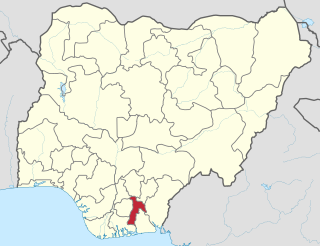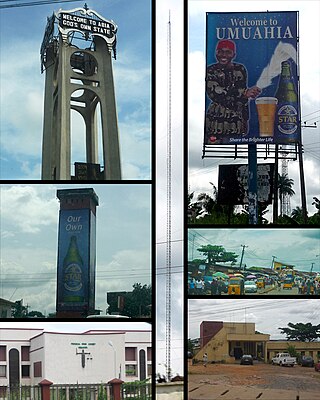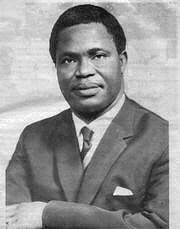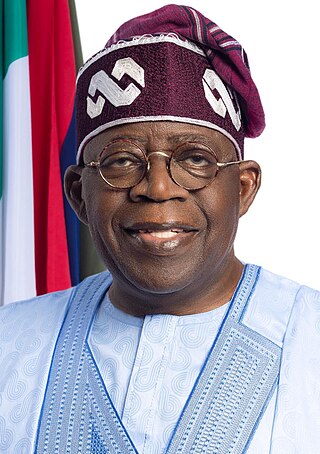This article needs additional citations for verification .(April 2015) |
Augustine Ukattah (August 28, 1918 – January 27, 1996) was a Nigerian teacher and politician.
This article needs additional citations for verification .(April 2015) |
Augustine Ukattah (August 28, 1918 – January 27, 1996) was a Nigerian teacher and politician.
Augustine Echewodor Ukattah was born at Ahaba-Oloko in the Ikwuano Local Government Area of Abia State, Nigeria, on August 28, 1918. [1] Ukattah was the fourth son of the Ukattah Nkor Abajuo family and Ejighiato Nwamgbede Ukattah, both of Ahaba-Oloko. His father died when he was very young and he had to grow up under his uncle, Chief Mathew Ugoani. He attended Christ the King Primary School in Aba and St. Theresa's School in Okigwe. After a brief spell as a Pupil Teacher, he entered the prestigious St. Charles Teacher Training College in Onitsha, [2] in 1941. He qualified as a Higher Elementary Teacher in 1944 and passed the Senior Teachers' Examination in History in 1948.
After he left St. Charles Teacher Training College in 1944, he was sent to Holy Cross School, Uturu – Isuikwuato, in 1946, as a Certificated Teacher, for his first teaching assignment. From 1946 to 1950, he was the Headmaster of St. Patrick's School Ogudu-Asaa in Isuikwuato. In 1951, following his outstanding record at St. Patrick's School, he was posted to head St. Bernard's School, Okigwe. He was later sent to Umuahia, in 1952, as the headmaster of St. Michael's Township School, known then for outstanding results in both academia and sports. He headed St. Michael's Township School, from 1952 to 1959. Between 1960 and 1962, he became the Catholic Mission Inspector General of Education. In 1963, he became Assistant Superintendent of Schools, a position he held until the end of Nigeria Civil War. He retired from active service in 1973.
While he was the headmaster of St. Michael's Township School, he was also active in politics and became secretary of the National Council of Nigeria and the Cameroons — the popular political party among Eastern Nigerians at the time. He was elected member of the Federal House of Representatives for Bende Division from 1954 to 1959 and then became a Senator in the upper house of the National Assembly representing Umuahia Province. In 1961, Chief Ukattah acted as Senate President of Nigeria, holding brief for Barrister, Dennis Osadebay. He was appointed leader of a high-powered Nigerian delegation to the Republic of Mexico via the United States in 1963 by then Prime Minister of Nigeria, Abubakar Tafawa Balewa, when he, as leader of the delegation, was privileged to have addressed a joint session of the Senate and of the Deputies of the Republic of Mexico. On return, he authored a book titled; "My Trip to Mexico". He also served for many years as a member of the Bende Native Authority, and Bende County Council. He was equally, first Chairman of the defunct Ikwuano County Council, now known as Ikwuano Local Government Area of Abia State, and for many years, President of both Ikwuano and Oloko Clan Unions.
In the late fifties, he sponsored the education of his youngest brother Ferdinand I. E. Ukattah in Great Britain, where he qualified as a barrister and solicitor in 1960 and was the first Ikwuano and Umuahia indigene to qualify as a lawyer and later, the Chief Judge of Imo and Abia States, of Nigeria.[ citation needed ]
In 1976 he received a Knighthood of the Order of St. Gregory, from Pope Paul VI.[ citation needed ] Also, in 1977, he became a Knight of St. Mulumba and until his death in 1996, he was the Grand Knight of the Order of St. Mulumba in Umuahia Catholic Diocese.[ citation needed ] In 1991, he was appointed a Justice of the Peace by the State Government.[ citation needed ]

The Catholic Church in Nigeria is part of the worldwide Catholic Church, under the spiritual leadership of the Pope, the curia in Rome, and the Catholic Bishops' Conference of Nigeria (CBCN).

Abia State is a state in the South-East geopolitical zone of Nigeria, it is bordered to the northwest by Anambra State and northeast by the states of Enugu, and Ebonyi, Imo State to the west, Cross River State to the east, Akwa Ibom State to the southeast, and Rivers State to the south. Abia is the only Southeastern state that has boundaries with the other four Southeastern states in Nigeria. It takes its name from the acronym for four of the state's most populated regions: Aba, Bende, Isuikwuato, and Afikpo. The state capital is Umuahia while the largest city and commercial centre is Aba.

Aba is a city in southeastern Nigeria and the commercial centre of Abia State. Upon the creation of Abia State in 1991, the old Aba township was divided into two local government areas, being Aba South and Aba North, while the suburban neighborhood of what was then known as Obioma Ngwa L.G.A. was divided into three L.G.A.s for administrative convenience. Aba South is the main city centre of Aba and Abia State at large, being located on the Aba River. Aba is made up of many villages such as Aba-Ukwu, Eziukwu-Aba, Obuda-Aba, Umuokpoji-Aba and other villages that have been merged for administrative convenience. Aba was established by the Ngwa clan of the Igbo people in Nigeria as a market town. Later, a military post was placed there by the British colonial administration in 1901. It lies along the west bank of the Aba River and is at the intersection of roads leading to Port Harcourt, Owerri, Umuahia, Ikot Ekpene, and Ikot-Abasi. The city became a collection point for agricultural products following construction of a British-made railway running through it to Port Harcourt. Aba is a major urban settlement and commercial centre in its region, which is surrounded by small villages and towns. The indigenous people of Aba are the Ngwa. Aba is well known for its craftsmen and is the most populous city in southeastern Nigeria. As of 2016, Aba had an estimated population of 2,534,265, making it the biggest city in South Eastern Nigeria.

Umuahia is the capital city of Abia State in southeastern Nigeria. Umuahia is located along the rail road that lies between Port Harcourt to its south,and Enugu city to its north. Umuahia has a population of 359,230 according to the 2006 Nigerian census. Umuahia is indigenously Igbo.

Abia State University Uturu (ABSU) is a Nigerian public university. It is one of the state-owned universities in Nigeria. These state academic institutions were created to expand admissions and bring professional skills, expertise and modern research facilities close to the city and rural dwellers, and have helped talented students to obtain higher education.

The Nigerian National Assembly delegation from Abia comprises three Senators representing Abia Central, Abia South, and Abia North, and eight Representatives representing Ikwuano/Umuahia North/Umuahia South, Bende, Isuikwato/Umunneochi, Arochukwu/Ohafia, Aba North/Aba South, Ukwa East/Ukwa West, Isiala Ngwa North/South and Obingwa/Osisioma/Ugbunagbo.
Eluoma is a town in Amawu, Isuikwuato, Abia State of Nigeria. It is the largest town in Isuikwuato, having more than 10 distinct villages. It also occupies the largest geographical space in the whole of Isuikwuato, and has the most varied vegetation, relief and drainage. It shares boundaries with Amiyi Uhu, Amiyi Obilohia, Otampa, Umuasua, Umuobiala, Nnunya and Umuahia. It is a few kilometres from Abia State University, Uturu, Abia State and about 20 kilometres from Umuahia, the capital of Abia State, in the South Eastern part of Nigeria. Eluoma people are Igbos by ethnicity and belong to what was formally called Igbo Union from which the "Central Igbo" was derived.
Ikwuano is a Local Government Area of Abia State, Nigeria. Its headquarters is in Isiala Oboro. The name 'Ikwuano' etymologically indicates that there are four different ancient kingdoms that make up the community called Ikwuano. These include Oboro, Ibere, Ariam/Usaka and Oloko.

Chief Patrick Nwokoye Okeke-Ojiudu KSS (1914-1995), also referred to as P.N. or P.N. Okeke, was a Nigerian politician, businessman, teacher, philanthropist and the patriarch of the Okeke-Ojiudu family. He was Minister of Agriculture from 1959-1966, a period known as the Nigerian First Republic.

Ernest Maduabuchi Ojukwu, is a past Deputy Director-General and Head of Campus of the Nigerian Law School, Augustine Nnamani Campus, Agbani Enugu. Before his appointment, he was Associate Professor and Dean Faculty of Law, Abia State University, Uturu from 1995-2001. He is also the President of the Network of University Legal Aid Institutions, the platform through which he has continued to achieve his dreams of promoting clinical legal education and reform of legal education in Nigeria.
Amawom is a town in Oboro, Ikwuano Local Government Area of Abia State, Nigeria. The name is derived from two words; Ama meaning location and Awom meaning farm. Amawom is believed to have been discovered in the 18th century. Awom Oboro and Ibeuzo Ukwu are the autonomous communities of Amawom. English and Igbo are the languages spoken in the town.
Oloko is one of the four clans that make up Ikwuano Local Government Area of Abia State, Nigeria. Oloko is from the Isuogu group. It borders Oboro to the north, Olokoro and Ngwa to the west, Ariam/Usaka to the east and Ikono; a clan in Akwa Ibom State to its south. Oloko is one of 18 Igbo clans of the Old Bende Division. It was classified in the Ohuhu-Ngwa cluster of the Southern Igbo area.
Oboro is the largest of four clans in Ikwuano Local Government Area of Abia State, Nigeria. It is bounded to the north by Ibeku and Bende clans, west by the Olokoro and Ngwa, east by Ibere and south by the Isuogu. Oboro was classified in the Ohuhu-Ngwa cluster of the Southern Igbo area by British anthropologists Forde and Jones. It is also one of 18 Igbo clans in the Old Bende Division of the defunct Owerri Province. The Oboro speak a common language with the other 17 clans of the Bende Division though dialectal variations exist. These clans share a history of inter-ethnic relations.
Ndoro is a town in Oboro, Ikwuano Local Government Area of Abia State, Nigeria. It is about 16 km southeast from the state capital, Umuahia and is located along the Umuahia-Ikot Ekpene Road.
Ibere is a clan located in the eastern part of Ikwuano Local Government Area, Abia State, Nigeria. It borders Oboro to the west, Bende to the north, the Isuogu to the south, Itumbauzo and Nkari to the east. It is one of 18 Igbo clans of the Old Bende Division. Ibere was classified in the Ohuhu-Ngwa cluster of the Southern Igbo area by Forde and Jones.

The 2023 Nigerian presidential election in Abia State will be held on 25 February 2023 as part of the nationwide 2023 Nigerian presidential election to elect the president and vice president of Nigeria. Other federal elections, including elections to the House of Representatives and the Senate, will also be held on the same date while state elections will be held two weeks afterward on 11 March.
Ahaba is a rural community in Oloko, Ikwuano Local Government Area of Abia State, Nigeria. Isiala Ahaba and Ahaba Ukwu are the autonomous communities of Ahaba. Ahaba is 23km south of Umuahia, Abia State's capital city.
Amaoba is an Oboro community in the Ikwuano Local Government Area of Abia State, Nigeria. It consists of two autonomous sister villages, Amaoba Ime and Amaoba Ikputu. Abaa Ukwu, Amaoba Ime and Ikputu Oboro are the three autonomous communities of Amaoba. Amaoba is 13 km away from the state's capital, Umuahia.
The 2023 Nigerian House of Representatives elections in Abia State was held on 25 February 2023, to elect the 3 House of Representatives members from Abia State, one from each of the state's three senatorial districts. The elections will coincide with the 2023 presidential election, as well as other elections to the House of Representatives and elections to the Senate; with state elections being held two weeks later. Primaries were held between 4 April and 9 June 2022.
Ogbuebulle is a village in Oboro, Ikwuano Local Government Area, Abia State, Nigeria. The community is situated along the Umuahia-Ikot Ekpene Road. It is about 20km away from Umuahia, the capital of Abia State. Ogbuebulle is part of the Ala-Ala Oboro Autonomous Community alongside Ekebedi, its neighboring village.
UKATTAH, Augustine Echewodor, M.H.R. teacher; b. 28 August 1921; ...
A. E. UKATTAH, BENDE: Age 36; educated at St. Charles' College, Onitsha. ...